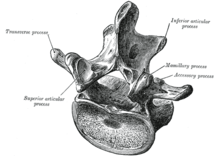Definify.com
Webster 1913 Edition
Vertebra
‖
Ver′te-bra
(vẽr′tē̍-brȧ)
, Noun.
pl.
Vertebrae
(#)
. 1.
(Anat.)
One of the serial segments of the spinal column.
☞ In many fishes the vertebrae are simple cartilaginous disks or short cylinders, but in the higher vertebrates they are composed of many parts, and the vertebrae in different portions of the same column vary very greatly. A well-developed vertebra usually consists of a more or less cylindrical and solid body, or centrum, which is surmounted dorsally by an arch, leaving an opening which forms a part of the canal containing the spinal cord. From this dorsal, or neural, arch spring various processes, or apophyses, which have received special names: a dorsal, or neural, spine, spinous process, or neurapophysis, on the middle of the arch; two anterior and two posterior articular processes, or zygapophyses; and one or two transverse processes on each side. In those vertebrae which bear well-developed ribs, a tubercle near the end of the rib articulates at a tubercular facet on the transverse process (diapophysis), while the end, or head, of the rib articulates at a more ventral capitular facet which is sometimes developed into a second, or ventral, transverse process (parapophysis). In vertebrates with well-developed hind limbs, the spinal column is divided into five regions in each of which the vertebrae are specially designated: those vertebrae in front of, or anterior to, the first vertebra which bears ribs connected with the sternum are cervical; all those which bear ribs and are back of the cervicals are dorsal; the one or more directly supporting the pelvis are sacral and form the sacrum; those between the sacral and dorsal are lumbar; and all those back of the sacral are caudal, or coccygeal. In man there are seven cervical vertebrae, twelve dorsal, five lumbar, five sacral, and usually four, but sometimes five and rarely three, coccygeal.
2.
(Zool.)
One of the central ossicles in each joint of the arms of an ophiuran.
Definition 2026
vertebra
vertebra
English

vertebra
Noun
vertebra (plural vertebræ or vertebrae or vertebras)
Synonyms
- spondyle (rare)
Derived terms
Terms derived from vertebra
Translations
any of the small bones which make up the backbone
|
|
See also
External links
Esperanto
Adjective
vertebra (accusative singular vertebran, plural vertebraj, accusative plural vertebrajn)
Antonyms
- malvertebra (“invertebrate”)
Hypernyms
- ĥordohava, ĥordula (“chordate”)
Related terms
- vertebro (“a vertebrate”)
Latin
Etymology
From vert(ō) (“to turn”) + -bra.
Pronunciation
- (Classical) IPA(key): /ˈwer.te.bra/, [ˈwɛr.tɛ.bra]
Noun
vertebra f (genitive vertebrae); first declension
Inflection
First declension.
| Case | Singular | Plural |
|---|---|---|
| nominative | vertebra | vertebrae |
| genitive | vertebrae | vertebrārum |
| dative | vertebrae | vertebrīs |
| accusative | vertebram | vertebrās |
| ablative | vertebrā | vertebrīs |
| vocative | vertebra | vertebrae |
Descendants
References
- vertebra in Charlton T. Lewis and Charles Short (1879) A Latin Dictionary, Oxford: Clarendon Press
- Félix Gaffiot (1934), “vertebra”, in Dictionnaire Illustré Latin-Français, Paris: Hachette.
Manx
Etymology
Borrowing from Latin vertebra.
Noun
vertebra f (genitive singular vertebra, plural vertebraghyn)
Synonyms
- junt craue-drommey
Derived terms
- vertebragh (“vertebrate, vertebral”)